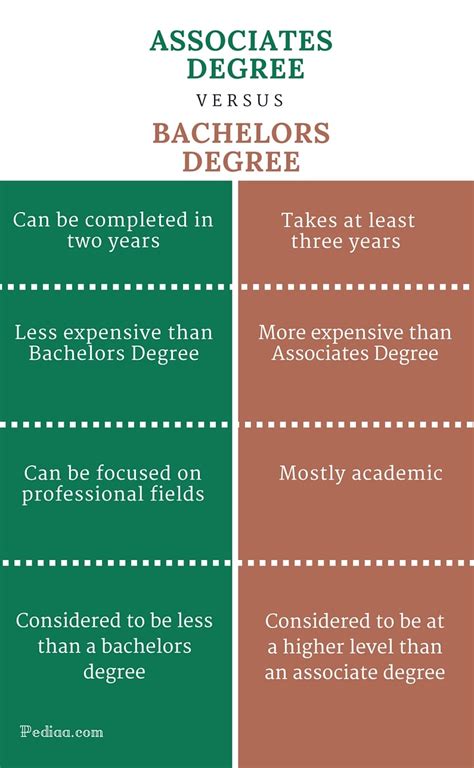Choosing the right higher education path can be a significant decision that impacts your career trajectory and personal growth. Two common options for undergraduate degrees are bachelor’s and associate’s degrees, each with distinct characteristics, benefits, and purposes. Understanding the differences between these two degrees can help you make an informed decision that aligns with your goals and aspirations.

Bachelor’s Degree vs. Associate’s Degree
| Feature | Bachelor’s Degree | Associate’s Degree |
|---|---|---|
| Duration | Typically 4 years | Typically 2 years |
| Level of Study | Baccalaureate | Associate |
| Academic Focus | Comprehensive, broad-based education in a specific field | Focused on specific skills and knowledge within a particular occupational area |
| Career Options | Managerial, professional, research | Technical, skilled trades |
| Earning Potential | Higher earning potential | Typically lower earning potential than bachelor’s degree holders |
| Graduate School Eligibility | Prepares students for graduate-level study | May not qualify for admission to graduate programs |
1. Duration and Level of Study
Bachelor’s degrees typically require four years of full-time study, while associate’s degrees can be completed in two years or less. Associate’s degrees fall under the category of post-secondary education, while bachelor’s degrees are considered undergraduate degrees.
2. Academic Focus and Career Options
Bachelor’s degrees provide a comprehensive education in a particular field of study, encompassing a broad range of subjects and developing critical thinking, problem-solving, and communication skills. They prepare students for careers in management, research, and other professional roles.
Associate’s degrees, on the other hand, focus on specific occupational skills and knowledge. They provide training in technical fields, such as healthcare, computer science, or trade professions. Graduates of associate’s degree programs are typically prepared for entry-level positions in their chosen fields.
3. Earning Potential
According to the U.S. Bureau of Labor Statistics, bachelor’s degree holders earn significantly more than associate’s degree holders over their lifetimes. On average, individuals with a bachelor’s degree earn about 85% more than those with only an associate’s degree.
4. Graduate School Eligibility
Bachelor’s degrees typically prepare students for graduate-level studies, such as master’s or doctoral programs. Associate’s degrees may not qualify individuals for admission to graduate programs, although some may be eligible for accelerated programs that allow them to complete a bachelor’s degree and then transition to a graduate program.
Determining the Right Degree for You
Choosing between a bachelor’s and associate’s degree depends on your aspirations, career goals, and financial situation. Consider the following questions to help you make a decision:
- What are your career goals?
- Do you desire a broad-based education or specialized skills?
- How much time and money can you invest in your education?
- What is the earning potential for the careers you are considering?
- Do you plan to pursue graduate studies?
Effective Strategies
- Research different degrees and career paths: Explore available programs at colleges and universities to understand the coursework, career options, and earning potential associated with each degree.
- Consult with academic advisors and career counselors: Seek guidance from professionals who can provide valuable insights and help you make an informed decision.
- Consider your strengths and interests: Choose a degree program that aligns with your passions and abilities to maximize your success and enjoyment in your studies.
- Plan financially: Determine the costs of tuition, fees, and living expenses associated with each degree program and develop a financial plan to support your education.
Tips and Tricks
- Consider dual enrollment programs: Take college courses while still in high school to get a head start on your bachelor’s degree or explore different career paths.
- Look for scholarships and financial aid: Explore various sources of financial assistance to help cover the costs of your education.
- Seek internships and work experience: Gain practical experience in your chosen field to enhance your resume and prepare for the job market.
- Network with professionals: Attend industry events and connect with individuals in your desired field to learn about career opportunities and gain mentorship.
